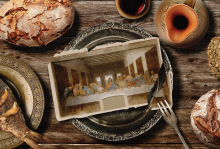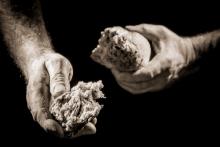shared meal

While they were eating, Jesus took a loaf of bread, and after blessing it, he broke it, gave it to the disciples, and said, “Take, eat; this is my body.” Then he took a cup, and after giving thanks, he gave it to them, saying, “Drink from it, all of you; for this is my blood of the covenant, which is poured out for many for the forgiveness of sins.”
— Matthew 26:26-28
CLIMBING ROCK HILLSIDES and wading across gurgling streams lined with thistles, a friend and I walked the Jesus Trail in Galilee a few years ago. After about 8 miles of vigorous hiking each day, the trail led to a hostel or home with a hot meal we shared with other travelers. Our common identification with Jesus on this journey from Nazareth to Capernaum made these bread-breaking events seem to us almost like a “Lord’s Supper”! We were strangers from different countries, but our hunger and our common passion for walking where Jesus walked drew us together.
If eating together helps create a bond between diverse people, what compelled the Apostle Paul to write these words to his house churches in the city of Corinth: “Now in the following instructions I do not commend you, because when you come together, it is not for the better but for the worse.” (1 Corinthians 11:17)?
How does eating a bread cube and drinking a swallow of juice with other church members make things worse in the congregation? What divisions are keeping people apart from each other? Let’s dig into the context.

Last night, my wife Janny and I had the honor of sharing a table with a gathering of local Muslims for an Iftar meal. It is currently Ramadan, which means the Muslim community around the globe fasts everyday day from sunrise to sunset. No food. No water. No tobacco. No sex. Each night they have a celebration feast to break their daily fast called the Iftar meal. It is sacred, joyous, and a time to sit with those they love to worship the One they love, Allah (which is simply the Arabic translation of God).
It was into that sacred gathering that they expanded the table and pulled up a seat for us and a few other Christian and political leaders throughout San Diego. Their hope was simply to create space in their daily practice for their neighbors to experience life with them. They were both acknowledging city leaders who have been proactive in creating an environment of dignity and mutual relationship, and creating a space for new/renewed understanding of one another. Acknowledging our core faith differences, they made clear that it should in no way detract from our ability to share a common vision for the good of our city. We are neighbors who live, work, and play on the same streets with a common desire to see deep, charitable relationships, sustainable economy, and mutual understanding and a celebration of diversity.
As I often say, as followers of Jesus, we have no choice but to move toward relationships with those who are marginalized, dehumanized, and in need of love. We don’t compromise our faith by hanging out with people we may or may not agree with. No, in fact, we reflect the very best of our faith.